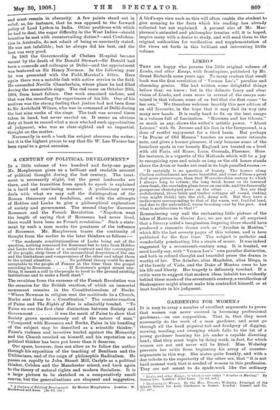CENTURY OF POLITICAL DEVELOPMENT.* IN a little volume of two
hundred and forty-one pages Mr. Macpherson gives us a brilliant and readable account of political thought during the last century. The treat- ment is necessarily slight, but the great landmarks are there, and the transition from epoch to epoch is explained in a lucid and convincing manner. A preliminary survey deals with what we may call the disintegration of the Roman theocracy and feudalism, and with the attempts of Hobbes and Locke to give a philosophical explanation of society and government. The second chapter discusses Rousseau and the French Revolution. "Napoleon went the length of saying that if Rousseau had never lived, there would have been no French revolution." Such a state- ment by such a man marks the greatness of the influence of Rousseau. Mr. Macpherson traces the continuity of thought from the earlier to the later thinkers as follows :—
" The moderate constitutionalism of Locke being out of the question, nothing remained for Rousseau but to take from Hobbes and Locke the two ideas of a social contract and the sovereignty of the people, strip them of the monarchical despotism of the one and the limitations and compromises of the other and adapt them
to the actual situation No political theory could be more acceptable to the people of France at the time than the gospel
according to Rousseau If Rousseau's gospel meant any- thing, it meant a call to the people to level to the ground existing institutions and to make a fresh start."
The revulsion from the excesses of the French Revolution was the occasion for the British reaction, of which an immortal monument remains in the Constitutionalism of Burke. "Where Newman in religion sent the multitude to a Church, Burke sent them to a Constitution." The counter-reaction of Paine and The Rights of Man is admirably treated. "To Paine we owe the first clear distinction between Society and Government it was the merit of Paine to show that Society grows spontaneously out of the nature of man."
"Compared with Rousseau and Burke, Paine in his handling of the subject may be described as a scientific thinker." Paine's violence and invective hurled against the Monarchy and the Church recoiled on himself, and his reputation as a political thinker has been put lower than it deserves.
Our space, however, does not allow us to follow the author through his exposition of the teaching of Bentham and the Utilitarians, and of the reign of philosophic Radicalism. He passes on rapidly to John Stuart Mill, Carlyle as a political thinker, Cobden and the Manchester school, and back again to the theory of natural rights and modern Socialism. It is a large picture' to be sketched on a comparatively small canvas, but the generalisations are eloquent and suggestive.
• A Century or Political Dere/op:mint. By Hector Macpherson. London: W. Blackwood and Sons. ps. 01. net.] A bird's-eye view such as this will often enable the student to give meaning to the facts which his reading has already collected but not explained. A perusal also of Mr. Mac- pherson's animated and philosophic treatise will, it is hoped, inspire many with a desire to study, and will send them to the original authorities for verification and supplementation of the views set forth in this brilliant and interesting little volume.






































 Previous page
Previous page